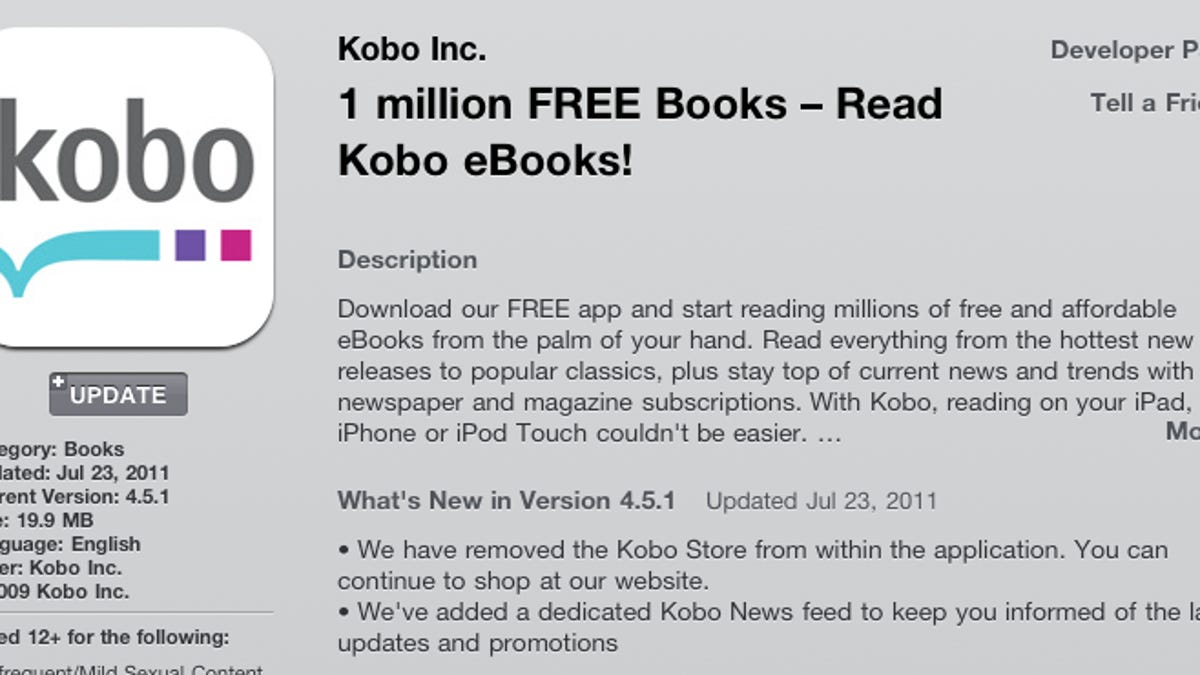Kobo creating HTML5 Web app to buffer Apple
Apple's new rules have forced e-book sellers to remove buy links from their iOS apps. Now Kobo says it's developing an HTML5 Web app that can be accessed from any Web browser, circumventing Apple's App Store.

Yesterday, we reported that Apple had finally cracked down on iOS e-reading apps, enforcing its new in-app subscription rules that require app developers to strip out any links to external mechanisms for purchasing digital books or subscriptions. Amazon, Barnes & Noble, and Kobo all altered their apps to reflect the rules change, removing any links or mentions of their respective company Websites.
Now Kobo is first out of the gate to announce that it's prepping an HTML5 Web app that will be accessible through Safari on the iPad, iPhone, or iPod Touch, and will provide improved functionality even beyond Kobo's current iOS apps.
In June, the Financial Times created an HTML5 app in an effort to cut Apple out of the content delivery equation and avoid paying Apple a 30 percent cut from subscription sales (Apple gets a 30 percent cut of any in-app sales). Pundits have been predicting that other media companies and content providers, as well as e-book sellers, would develop HTML5 apps to gain more control and avoid having Apple dictate the terms of apps that are made available through the Apple App Store.
Kobo sees its upcoming HTML5 app, which is due out "this year," as a complementary offering to its current iOS and Android apps that allows the company to reach more platforms without having to develop separate apps. It's also an insurance policy in case Apple decides to change the rules again.
When it comes to iOS apps, "Apple's in full control," Kobo's Chief Technology Officer Dan Leibu told CNET in an interview this morning. "It sets the rules unilaterally. And it could change them down the road. So the future is a little bit uncertain there. This gives our users one more option."
The way browser-based HTML5 apps work is you simply go to a specific Web address on your iPad or iPhone (in the case of the Financial Times it's app.ft.com) and follow the directions to add the app to your home screen. The Financial Times app is optimized for iPad and iPhone but there's no reason it couldn't be optimized for other mobile devices (supposedly, that's in the works).
With an HTML5 e-reader app like Kobo, you'd need to have an Internet connection to buy content or sync your library. But once you do sync your library, you can access those e-books (and newspapers and magazines) offline.
Leibu said Kobo's HTML5 app will offer additional features beyond what Kobo's current apps offer. "One of the advantages of an HTML5 app is that you can dynamically pull in other content--video, for instance--and do mash-ups. We'll have the features our current apps our known for, like Reading Life. But we're looking at this as an opportunity to rethink the apps and enhance them further."
Leibu added that about 25 percent of Kobo's e-book sales come through iOS apps and that he expects that removing the buy links in those apps will hurt business a bit in the short term but it won't have a huge impact.
As for Amazon and Barnes & Noble, we suspect that both companies are looking into developing HTML5 versions of their Kindle and Nook apps and most probably have them in the works already. How Apple will respond to these moves is unclear, but expect more companies to jump into the HTML5 app arena soon.

